Month: November 2009
The Lie
So Josh Leonard‘s The Lie, which would be called a mumblecore marital drama if the word “mumblecore” hadn’t been expunged from the indie-realm vocabulary, won’t be ready for Sundance ’10. L.A. Times reporter Mark Olsen suggests South by Southwest or Cannes as possibilities. Mark Webber and Jess Weixler costar.
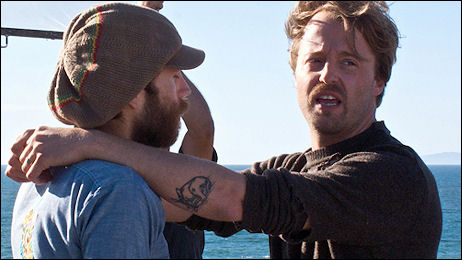
The Lie director Josh Leonard (the bearded goofball smoothie in Humpday) directing Mark Webber.
Here’s the T. Coraghessan Boyle short story the film is based upon.
Snap Daddy

Saturday, 11.29, 7:48 pm.

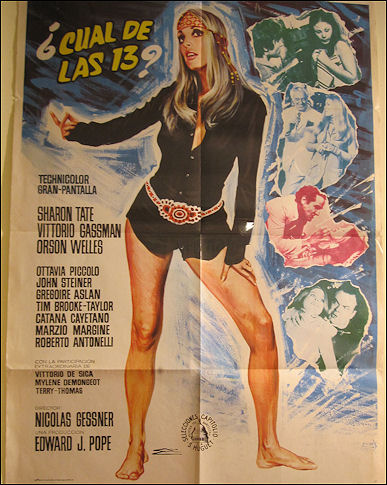
If I hadn’t wandered into an upscale framed-poster store in Chelsea, I probably never would have visited the IMDB page of this 1969 Vittorio Gassman-Sharon Tate film, which has an English-language title of 12 + 1. It was Tate’s last film. She was three months pregnant and starting to show very slightly when production began in March 1969. Movies have been my faith and religion all my life and I’ve never heard of this thing. It’ll almost certainly never see a DVD release.
Pepsi Pundit Challenge
I realize I’m pretty much alone in believing that Oscar pundits should try and lead a little bit — maybe even inspire on some level — in their award-season scribblings. They could and should do this, I feel, by subtly or superstitiously or irrationally stepping outside the box and doing more than just predicting which films and performances the Hollywood voting community is going to favor. Now and then, at least.
Like me and Gold Derby‘s Tom O’Neil and one or two others, they should mysteriously and inconsistently blend their predictions with some personal conviction of their own — a little feeling, a little seat-of-the-pants instinct or passion or spittoon-spitting. I realize that some sorta kinda do this but others seem averse. With a soapbox comes responsibility, and I think they should try to stir the pot and rouse the choir a little. From November to mid December, at least. Or until early January…whatever.
I only know there can’t be anything more tedious than to just sit in the bleachers and say, “I think the Academy’s going to vote for this” or “No, no, I think you’re wrong…the Academy is going to vote for that!” What could be worse than to be lying on your deathbed and saying to yourself, “Well, I sure knew how to quack like a duck when it came to Oscar predictions!”
Some pundits and columnists make a practice, I realize, of posting their personal year-end favorites with no attention paid to politics or award predictions or anything. I just did this earlier today, and I realize that posting such a list is an acknowledgement that politics and box-office and predictions are mostly what columnists pay attention to. We all know what the game is. I obviously play it and pay my bills with the ad revenue. But every so often you have to stand up and be yourself and…you know, expand the repertoire.
I’m respectfully requesting here and now that those who haven’t yet posted a personal preferences list to do so. Clean out your head and throw caution to the winds and just say what you really feel about the films you’ve seen this year. Your readers would like to know, and so would I.
Nice
Sincere thanks to Ben Stiller for mentioning my involvement in the Tokyo Film Festival screening of The Cove on last Thursday’s Larry King Show. Stiller and Cove hero Ric O’Barry discussed The Cove and how, as the Huffington Post summarizes, “with Stiller’s help [the film] was shown at the Tokyo Film Festival.” Close enough.
Can’t Be Moved
I started to do a riff on The Hurt Locker as in order to explain why it’s sitting at the top of the 2009 Pure Pleasure list, but it went off in another tangent after I began talking about having recently met a couple of women who hadn’t heard of Kathryn Bigelow‘s film. Not 20-something waitresses this time but two well-to-do women in their 50s who’ve obviously been around and gotten a good grasp of things. Here’s how I put it:
Bigelow’s Iraq War thriller took me into a world of zero safety and security — the anxiety-plagued, dry-sweat realm of a military bomb-defusal squad in 2004 Baghdad. Except Bigelow and screenwriter Mark Boal do give us security — the kind that a person who’s “good” (in the Howard Hawks sense of that term) brings to this daily threat. A guy, in short, like Jeremy Renner‘s Sgt. James — smart, highly skilled, improvisational and focused like a madman.
And there’s the rub. James is an adrenaline junkie who simultaneously protects and endangers his team (Anthony Mackie, Brian Geraghty). The movie, likewise, also enthralls and unnerves audiences, and leaves them with an experience they’ll never forget.
The irony is that all those Hurt Locker raves that have been pouring in all year seem to have persuaded potential audiences that it’s an experience they’d rather not have in the first place.
If you’re averse to edge-junkie anxiety then Bigelow’s film is probably going to put you off on some level. The odd thing is that so many critics and filmmakers and cinema buffs have been turned on by this film, which is a guaranteed lock for a Best Picture nomination, and yet it’s only made $12 million. What’s this about apart from Summit Entertainment not knowing how to sell it, or lacking the will to keep plugging away?
I’ll tell you what the problem is. One, eight out of ten action-and-excitement fans (i.e., under-40 males) seem to prefer Michael Bay/Roland Emmerich CG crap to real-deal tension machines like The Hurt Locker. And two, women won’t deal with it. The buzz has convinced them that it’s too threatening, too invested in a situation that’s almost totally about non-assurance, and isn’t in the least bit concerned with fortifying the nest. (Which it isn’t, to judge by what Sgt. James does at the end.)
These are the same women, by the way, who won’t go to see The Cove because they don’t want to see Flipper get stabbed. And the same women who are going this weekend to The Blind Side and can’t wait to pay to see It’s Complicated.
Mainstream women have actually gone farther, I believe, than simply not buying tickets to The Hurt Locker. As with most war films I think many if not most women have instinctually decided to ignore it — to emotionally and psychologically wrap it up in newspaper and drop it in a garbage can.
The other night inside the Hotel Regency bar I spoke to two bright and attractive women in their 50s who hadn’t even heard of The Hurt Locker, and one of them used to work as a talent manager and knew the movie world that I live in (or lived in during the ’90s) pretty well. It’s one thing for sophisticated ladies to say “no thanks” or that they’d rather wait for the DVD, and another to say (and during Oscar season yet!), “What’s the title again?”
I suspect that these women (and millions like them) did hear of The Hurt Locker around the time it opened last summer, but they erased it off their hard drives so quickly and instinctually that it’s like it never existed. Physiologically the title was heard by their ears — the sound waves got through — but psychologically it was brushed off like cows in the pasture flicking at flies with their tails.
Best Pure Pleasure Films of 2009
By my yardstick at least 13 extraordinary films — each with some kind of striking, original-seeming quality and made from deep-seated, rock-solid material — opened in 2009, and four others came close to breathing the same air. Anyone who whines that ’09 was a weak year just hasn’t been paying attention or has been living in a cocoon. It wasn’t one of the all-time great years, okay, but it was certainly more than decent if you brought an intelligent, open-minded, ready-for-the-next thing attitude to the theatre.
On 11.18 I said I’d be assembling a list of ’09 films and filmmakers that achieved one of two things. One, they simply gave me enormous viewing pleasure. (Even if an isolated aspect of some of these films was the primary provider with other aspects registering or satisfying less than 100%.) Or two, they introduced me to some new aesthetic or style or attitude that I hadn’t really absorbed before but which I felt very comfortable with as I left the theatre.
A list, in short, of my favorite films that I liked for my own damn reasons and which I’ll end up owning on DVD or Bluray and will most likely revisit from time to time in years to come. So in this particular instance let’s say “to hell with taking the pulse of the town” and paying lip service (or list service) to Oscar pundit consensus favorites.
In order of preference with links to my original raves…
First-place tie between The Hurt Locker and Up In The Air. The former because it blended a sense of profound existential peril and a completely believable, no-GG, real-world excitement with amazing expertise. And the second because it’s one of the calmest and most unforced this-is-who-we-are, what-we-need and what-we’re-afraid-of-in-the-workplace movies ever made — and blissfully free of the usual Hollywood bullshit and jerk-offery, and with a kind of Brokeback Mountain-y theme at the finale — i.e., “move it or lose it.”
Followed by (in order of vague preference) Pedro Almodovar‘s Broken Embraces, Chris Smith‘s Collapse, Joel and Ethan Coen‘s A Serious Man, Lone Scherfig‘s An Education, Armando Ianucci‘s In The Loop, Cary Fukunaga‘s Sin Nombre, Michael Man‘s Public Enemies, Lynn Shelton‘s Humpday, Tom Ford‘s A Single Man, Louie Psihoyos‘s The Cove, Neil Blomkamp‘s District 9, Sacha Gervasi‘s Anvil! The Story of Anvil, James Toback‘s Tyson, Steven Soderbergh‘s The Girlfriend Experience, Paolo Sorrentino‘s Il Divo, and Jane Campion‘s Bright Star (for the production design and cinematography, and for Abby Cornish‘s performance).
17 Revisitings
I’ve assembled sequential excerpts from my original reviews of the 17 Pure Pleasure films of 2009, starting with my 5.24.08 review of Il Divo and ending with my Toronto Film Festival 9.17.09 review of Collapse. I haven’t seen Avatar yet (it’s supposed to screen on 12.10), but the bottom line is that there are no October, November or December ’09 releases on the list.
(1) From “Gospel of Il Divo,” 5.24.08:
“Never overdramatize things. Everything can be fixed. Keep a certain detachment from everything. The important things in life are very few.” — former Italian Prime Minister Giulio Andreotti, whose political career, particularly the events that led to revelations about his ties to the Italian mafia and reported complicity in the murder of a journalist, is dramatized in Paolo Sorrentino‘s Il Divo.
“Wisdom, or a semblance of same, sometimes comes from very odd places. There’s nothing very admirable about the Andreotti portrayed in Il Divo — an uptight, coldly calculating Machievellian politician of the highest (or lowest, as the case may be) order. But since hearing the above lines, I haven’t been able to shake them. They’ve almost become a kind of mantra to me. Hearing them spoken by actor Toni Servillo (whose performance as Andreotti is somewhere between a marvel and a hoot) led to some kind of ‘aha!’ moment.”
(2) From “Good As It Gets,” 9.9.08:
“The Hurt Locker is absolutely a classic war film in the tradition of Platoon, The Thin Red Line, Pork Chop Hill, Paths of Glory and the last 25% of Full Metal Jacket. Set in Baghdad and the full maelstrom of that godforsaken conflict, this is a full-power throttle, nail-biting, bomb-defusal suspense film that gradually becomes a kind of existential nerve ride about the risk and uncertainty of everything and anything, plus an explanation of the addiction that war is for some guys who go through it and can’t quite leave it alone.
“There is no ‘wrong’ or ‘right’ judgement about any film, but now that I’ve seen The Hurt Locker I’m stunned that Variety‘s Derek Elley could have panned it the way he did at the Venice Film Festival, calling it a hellish thing to sit through, and one that says nothing new about the Iraq War U.S. troop experience, and that it takes too long to get to the point (such as it is). What did Elley see over there? Was he on painkillers?”
“Something is very wrong with life, the world, human nature and the film business when a movie this knock-down good is still hunting for distribution. I’m obviously aware of all the Iraq War films that died last year but this movie is something else. You don’t shun movies like this. If you’re a distributor and that’s your judgment — walk away, we can’t sell it, we’ll lose our shirts — then you need to get out of the movie business and start selling refrigerators or cars.”
(3) From HE In The Loop review, 1.13.09:
“In The Loop is easily one of the funniest comedies about governmental inanity and media mis-speak I’ve ever seen. It also felt to me like one of the fastest laughers of this type since Billy Wilder‘s One, Two,Three. And it has some absolutely wonderful insult humor. I’m talking one beautiful saber thrust and club-bludgeon after another.
“It’s basically about how the media can sometimes focus on a gaffe by an official or spokesperson and make it sound (via sheer repetition and obsession) to represent firm government policy concerning this or that major issue.
“In The Loop‘s major issue is a potential military conflict involving U.S. and British troops — think Iraq in ’02 and early ’03. The humor is about how various second- and third-tier government types in London and Washington try to dodge, maneuver and counter-spin their way around an essentially meaningless statement by a British cabinet minister that war is ‘unforeseeable.’ Meaningless and yet strangely meaningful once the media gets hold of it. And the source of endless misery for many people.”
(4) From “A Knock-Out Education,” 1.18.09:
“Lone Scherfig‘s An Education, a coming-of-age period drama set in 1961 London, is the absolute shit — the best film of the Sundance Film Festival, a finely tuned and deeply engaging film by regular popcorn-watching standards, an award-calibre drama that will definitely be in contention at the end of the year, and a movie that has launched a genuine movie star in an old-fashioned and yet very new-fashioned sense — 23 year-old Carey Mulligan.
“I know that special old-soul-mixed-with-youthful-effervescence quality that you see in very few actors and actresses over the years, and trust me, Mulligan has it. A wondrously true and satisfying film has broken out of the Sundance ’09 pack, and a brand-new actress with just the right face and just the right approach and precisely the right touch of sadness in the corners of her mouth has hit one out of the park.”
(5) From Girlfriend Experience review, 1.20.09:
“I was pretty okay with The Girlfriend Experience. It smacks of right-now verite, is smartly written and very well made. (And recently shot also with all kinds of references to the Obama-McCain race and the economic meltdown.) No one would call it the stuff of high Shakespearean drama, but I wasn’t bored for a second. It’s smallish and low-key like Soderbergh’s Bubble, but set in Manhattan and focusing on a very pretty upscale prostitute and the various men in her life — boyfriend, journalist, high-rollers looking to buy her favors, Glenn Kenny‘s slimeball website journalist, etc.
“I presume that everyone reading this knows that Soderbergh is far too dry, ironic and circumspect to be a provider of hot sex scenes or even mildly suggestive ones (as in, say, Alan Resnais‘s Hiroshima Mon Amour). He maintains a cool distance in this regard at all times, which is welcome considering the appearance of Grey’s clients. Some of them, I mean. Two or three inspired a prayer from yours truly: ‘Please, God, I don’t want to see any middle-aged butt cheeks or bloated stomachs or funny-looking feet.'”
(6) From Sin Nombre review, 3.19.09:
“Sin Nombre is a tough, fully-believable story about survival, love, family and fate. (Or luck, as it were.) Every frame is solid, lean, gristly and true. There’s no question about it — Cary Fukunaga is a major new director.”
(7) From “Toback at Harvard Club, 4.11.09:
“My interview earlier today with Tyson director James Toback was easily the most spirited, relaxed and and enjoyable discussion I’ve had with anyone in a long while, taped or not. Toback is one of the most sage observers I’ve ever known, and hands down the greatest gabber — not in a blah-blah, listen-to-me-talk sense but in the vein of a guy who just knows and doesn’t believe in trimming his sails. Intimidation (even the intimidation that beautiful women impose on the best of us) never seems to affect him. He doesn’t seem to know from hesitancy. Which is why his discussions with Mike Tyson went so well, which is the main reason, I feel, why Tyson connects.”
(8) From “Anvil Guys,” 4.19.09:
“How can Sacha Gervasi‘s Anvil! The Story of Anvil not wind up being nominated for Best Feature Documentary Oscar? It’s got heart, it’s about over-the-hill, down-on-their-luck artists getting their groove back, it’s well made, it’s connecting with audiences, it’s funny, it’s lowbrow-highbrow. How can Academy’s doc committee ignore it?”
(9) From Bright Star review, 5.15.09:
“It’s been done quite perfectly — I was especially taken with Greig Fraser‘s Vermeer-lit photography — with immaculate fealty for the textures and tones of early 19th Century London, and a devotion to capturing the kind of love that is achingly conveyed in hand-written notes that are hand delivered by caring young fellows in waistcoats. You know what I mean.
“But it struck me nonetheless as too slow and restricted and…well, damnably refined. I looked at my watch three times and decided around the two-thirds mark that it should have run 100 rather than 120 minutes. I know — a typical guy reaction, right? The pacing is just right for the time period — it would have felt appalling on some level if it had been shot and cut with haste for haste’s sake — but there’s no getting around the feeling that it’s a too-long sit. It’s basically a Masterpiece Theatre thing that my mother will love. I’m not putting it down on its own terms. I felt nothing but admiration for the various elements.”
(10) From HE Broken Dreams Cannes review, 5.19.09:
“Broken Dreams is easily the most fully realized, thematically satisfying, self-assured and purely entertaining film of the festival so far. Not as fully emotional as Almodovar’s best films, but on a very high station in the second tier. Way in front of anything I’ve seen so far.”
“Partly a romantic noir, partly a tragedy about playing around, largely about creative creation and holding to a vision and putting things right in the end, the story spans some 16 years (set in ’08, flashing back to ’92 and ’94). It focuses on a film director (Luis Homar) who’s lost the love of his life (Penelope Cruz) as well as his eyesight to a jealous lover, and how after much revelation he achieves a kind of satisfaction in the end. I’ll say no more except that it’s a profound and enriching finish all around.
“Pedro World is a perfect haven, a warm cave filled with invention, brilliance, constant emotional intrigue, suspense, and exactitude. It’s a place to hang, a place of assurance that always mesmerizes and delights and makes you feel well taken care of, like you’re staying in some $2000-a-night hotel in some tranquil valley.”
(11) From “Enemies Forever,” 6.24.09:
“Michael Mann‘s Public Enemies is glorious and levitational — the most captivating, beautifully composed and freshly conceived gangster movie since Bonnie and Clyde. It’s an art film first, a Mann head-and-heart trip second, a classic machine-gun action pulverizer third, and a conventional popcorn movie fourth. The schmucks will go ‘meh’ and the people who are hip enough to understand what this movie is doing/has done will retire to tens of thousands of nearby cafes and talk it over for at least a couple of hours.”
(12) From “Total Cove Guy,” 7.16.09:
“You don’t come out of The Cove simply saying ‘really good movie!’ (although you do). You come out The Cove wanting to fly the next day to Taiji, Japan, in order to kick some Japanese dolphin-slaughtering ass. You come out furious and moved and converted and dug in.
“No one should get the idea that The Cove is primarily a classroom-lecture piece and an eco-activist movie, although it is obviously those things in a political undertow sense. Because it’s first and foremost a very well-made, thoroughly watchable murder-mystery — a gripping and entertaining sit by any standard. (Unless you happen to be, you know, an idiot.)
“That’s right — murder. As in seawater turning pink and then blood red. Anyone who’s ever watched the various Flipper entertainments (the two early ’60s movies, the ‘ mid ’60s TV series, the 1996 feature with Elijah Wood) or has visited any kind of Sea World amusement park needs to see it especially. And no wimping out (or allowing the girlfriend/wife to steer you away from it). Stand up, man up and buy a ticket when it opens on 7.31.”
(13) From “Prawns, Dust and Garbage,” 8.14.09:
“There’s so much garbage, dirt, dust and detritus in [District 9] that I started to feel physically dirty after a while. I almost began to smell the stench. I began to feel like taking a shower or at least using some sanitary wipes.
“If someone had come up to me and said ‘if you give me $20 bucks I can fix it so that the movie will stop with the dust and the desaturated color and all the scuzzy gooey stuff and cut to a full-color scene in a fashion mall with a couple of pretty women talking about nothing over margaritas,’ I would have given him the money. Dust! Fucking smelly dust and skanky garbage and black goo leaking out of wounds! I needed to get away from this for a minute or two.
“And I wasn’t all that rocked by the way the story rocks and lurches, taunting you into thinking ‘ahah, okay, things are going to work out’ only to pull the plug and leave you in the lurch, only to push the plug it back into the wall again. Up, down, in and out, oh my God…here we go!, hair-trigger, cliffhanger. Writing a story along these lines is a wanker’s game. Come to think of it, it’s an old Peter Jackson tactic.
“And I’m not a big fan of ‘the cackling villain who can’t be killed & shan’t be killed until the very end’ cliche. Nor do I admire endings that leave everything & everyone hanging in the lurch in preparation for the sequel. District 9 is definitely playing this game.”
“But I agree with those who’ve been saying that Michael Bay could learn a thing or two from director Neil Blomkamp. District 9 is watchable and inventive and alive on the screen, which is more than you can say for Transformers 2.”
(14) From “Calmly Touches Home,” 9.11.09:
“Up In The Air really has it all — recognizable human-scale truth, clarity, smart comfort, the right degree of restraint (i.e., knowing how not to push it), and — this got me more than anything else — a penetrating, almost unnerving sense of quiet. It doesn’t tell you what to feel — it lets you feel what it is. All the best movies do that. They don’t sell or pitch — they just lay it down on the Oriental carpet and say to the viewer, ‘We’ve got a good thing here, and if you agree, fine. And if you don’t, go with God.’
“You know what? The hell with that attitude. If you really watch and let this movie in and then say, as a friend of a good friend said after watching it in Telluride a few days ago, ‘I don’t know…it’s nice but it’s more like an okay ground-rule double than a homer,’ then due respect but you’re the kind of person who likes candied popcorn and Strawberry Twizzlers and feel-good pills. No offense.
“The thing that puts Up In The Air over is that it’s about right effin’ now, which is to say the Great Recession current of 2009. Reitman has been working on the script for six years, and if the film had come out last September — just as the bad news about what those greedy selfish banking bastards had done was being announced and everyone started to mutter ‘uh-oh’ to themselves — it wouldn’t be reflecting the cultural what-have-you as much as it is now. And yet it never alludes to anything that specific. It doesn’t have to.”
(15) From “Slow Death by Jewish Kiki,” 9.11.09:
“Joel and Ethan Coen‘s A Serious Man is a brilliant LQTM black comedy that out-misanthropes Woody Allen by a country mile and positively seethes with contempt for complacent religious culture (in this case ’60s era Minnesota Judaism). The Coens are fearless at this kind of artful diamond-cutting. …and it absolutely must rank as one of the year’s ten Best Picture nominees when all is said and done.
“The worldview of this maliciously wicked film (which isn’t ‘no-laugh funny’ as much as bitter-toxic funny, which I personally prize above all other kinds) is black as night, black as a damp and sealed-off cellar. Scene after scene tells us that life is drip-drip torture, betrayal and muted hostility are constants, all manner of bad things (including tornadoes) are just around the corner, your family and neighbors will cluck-cluck as you sink into quicksand, etc.
“This is the stuff that true laughter is made of, and this is a genuinely wonderful film to sit through because of it. It’s so refined and compressed , so precisely calibrated and cold as nitrogen, and yet hilarious as Hades. Literally. I can’t wait to catch it a second time.”
(16) From “Lonely Number,” a Single Man review that ran on 9.16.09
“The thoroughly readable feelings in the features of star Colin Firth — longing, grief, numbness, curiosity, contentment — keep A Single Man aloft. Along with the immaculate visual values, of course. The film reminded me visually at times of Michelangelo Antonioni‘s Red Desert and tonally of La Notte. The conservative gayish vibe will mean box-office issues with hinterland heteros, I suppose, but it’s so exquisitely composed and refined and well-written, etc. It’ll be a huge hit with urban gay audiences, but film lovers of all persuasions owe it to themselves.”
(17) From “Collapse Wallops,” 9.17.09:
“The reason I’m only 5% concerned with Michael Ruppert‘s credibility is because he fits the paradigm of other crazy prophets who’ve been right. He’s the aged soothsayer who went up to Julius Caesar and said ‘beware the Ides of March.’ He’s Elijah, the man in rags who warned Ishmael in John Huston‘s Moby Dick that ‘there will come a day when ye shall smell land but there will be no land, and on that day Ahab will go to his grave…but within the hour he will rise and beckon.’ He’s I.F. Stone, whose newsletter called it right on so many issues in the ’60s and ’70s.
“Isn’t it in the nature of most alarmists to be alone and uninvested in establishment currencies and memberships with a tendency to shout from streetcorners, publish nickel-and-dime newsletters or expound in low-budget documentaries such as Collapse?”
Signing Off
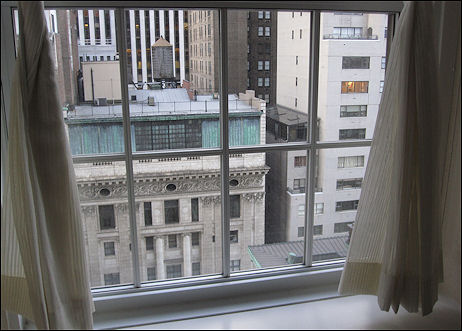
Sunday, 11.28, 8:25 am.

Without the slightest doubt the single most soothing image I have in my entire photo library. Positano has been overtaken and polluted by schmuck tourists, but I’d go back there again in a second. Taken in late May 2007.
Biggest Bullock Ever
One of my many derelictions right now is not having seen John Lee Hancock‘s The Blind Side, which I’m planning to catch tomorrow. It’s a much bigger hit than box-office pundits were expecting, of course. “A 47% uptick from its opening day B.O. with $16.2 million on 3,140 runs…pic’s domestic cume stands at $76.3 million,” Variety reports.
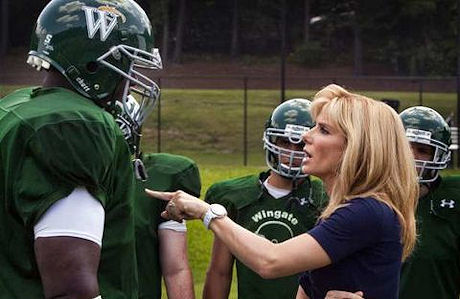
The basic appeal, I’m guessing, is that it’s a good Middle American movie that’s not informed by the neurotic mentalities of the coasts. I heard this morning that a rival distributor (i.e., not a Warner Bros. guy) recently projected to a friend that it will ultimately make north of $200 million. It’s the only film besides Up to have a CinemaScore A-plus so far. Old news, chasing the tail, etc.
Guess
“Bright vivid technicolor…like Spielberg directed it…a serial-killer movie meets The Color Purple…Silence of the Lambs meets What Dreams May Come.” — a friend who caught a screening last night in Los Angeles.
Cate’s Streetcar
A couple of hours hence I’ll be heading over to BAM’s Harvey Theatre and a matinee performance of the Sydney Theatre Company’s A Streetcar Named Desire, which began yesterday and runs only through 12.20. The lure, of course, is a reputedly devastating Cate Blanchett as Blanche Dubois. The classic Tennessee Williams play was directed by Liv Ullman, and costars Joel Edgerton as Stanley Kowalski and Robin McLeavy as Stanley’s wife and Blanche’s sister, Stella.
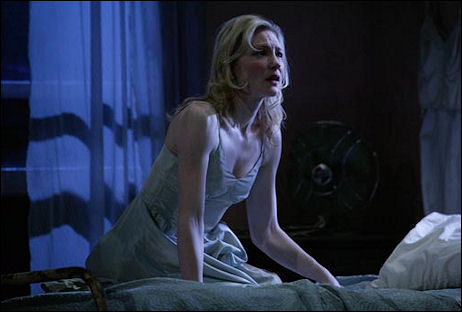
Cate Blanchett in BAM’s A Streetcar Named Desire.
“If Blanchett’s nerve-shattering turn doesn’t knock the wind out of you, then there is nothing on a stage that can blow you away,” wrote Washington Post critic Peter Marks on 11.2. “What Blanchett achieves…amounts to a truly great portrayal — certainly the most heartbreaking Blanche I’ve ever experienced.”
I know the Streetcar dialogue so well I’ll be able to mouth a good part of it along with the actors. Like Winston Churchill mouthing Hamlet from the front row as he watched Richard Burton perform it on the London stage in the ’50s.
The run is totally sold out, of course. Impossible to get tickets except through fiendish scalpers. 190 minutes with intermission, or something like 170 or 175 minutes without. Elia Kazan‘s 1951 film ran 122 minutes, or roughly 50 minutes shorter.
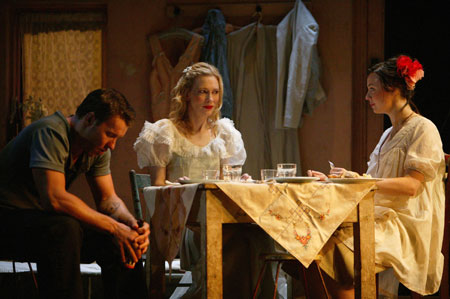
Edgerton, Blanchet and McLeavy
